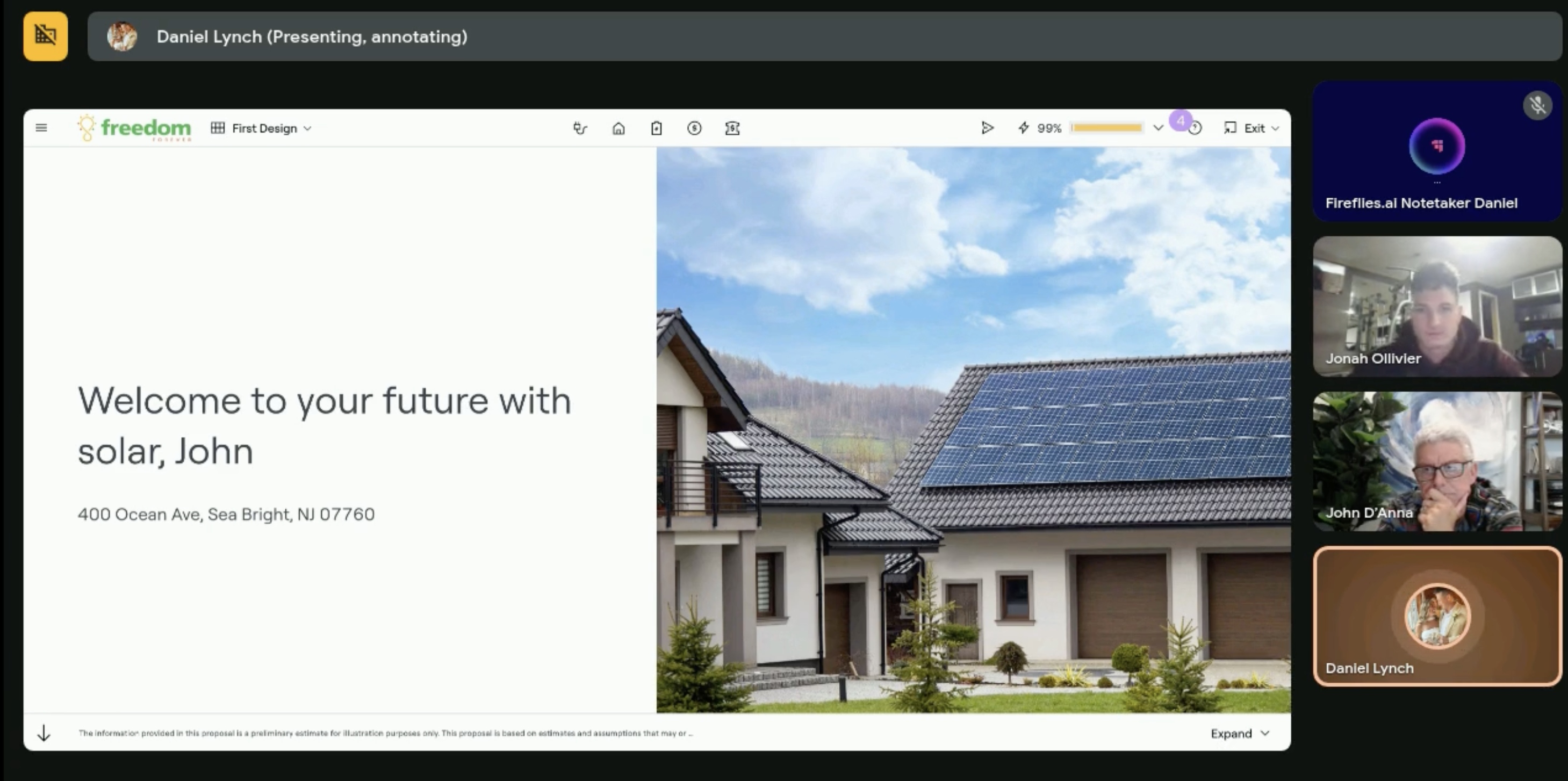Explore America's #2 Highest Paying industry, according to forbes
With America's #1 Residential installation company,Freedom Forever with a real roadmap and real support.
Start a Solar Career — Training Is Free
No Experience Needed
SolarLink pays the cost to get you trained, certified, and launched. No credit card. No paid course.
- Free solar sales course + certification path (SolarLink covers all the necessary cost for certification)
- No door knocking. No cold calling required to start
-Work with a professional 1 on 1 trainer and support agent (so you’re not left alone)
- Company Generated Appointments Booked On Your Calendar unlocked after certification.
- US-based only | Nationwide opportunities
Watch the video below for a breakdown of what makes SolarLink different.
5 Steps To A Career With SolarLink
1) Apply to Join (Free to Start)
Not everyone gets accepted. SolarLink is an application-based path to become a Dedicated Solar Professional in Training (DSPiT) — built alongside Freedom Forever, one of America’s largest residential solar installers. It’s free to apply and free to get started — no fees, no credit card.
2) Fast-Track Onboarding + Daily Live Coaching
We don’t believe in “training forever.” We built a fast-track onboarding that gets you competent quickly — the basics of solar, how we build systems, what to do first — plus daily live coaching so you can ask questions, get real feedback, and keep improving while you take action.
3) Appointments Become Available Once You’re Certified
We don’t train people and then hope they find work. Once you’re certified and approved, you can qualify for company-generated appointment opportunities based on your market and availability — so you’re stepping into a system where homeowners are already raising their hand for help.
Availability varies by location and schedule.
4) Partner With a Mentor + TAP Support
If you’re accepted, you won’t be doing this alone. You’ll be paired with a Talent Activation Partner (TAP)—your personal guide to keep you on track—and you’ll learn alongside some of the best closers in the solar industry through live coaching, call breakdowns, and real advice. The goal is simple: get your first reps fast, tighten your delivery, and move from “watching training” to running real presentations with confidence.
5) Certification = Full Earning Power
Certification is the gateway. It proves you’re trained, trusted, and ready — and it unlocks full access inside SolarLink. Once certified, you can produce as much business as you want and earn as many commissions as you want based on your effort and consistency.
Earnings vary based on effort, skill, and market. No guarantees.
Frequently Asked QUESTIONS
1. Do I need previous sales experience?
No — we train you from the ground up here at SolarLink. If you follow our system, you’ll learn exactly how to connect with homeowners, book quality appointments, and earn commissions without needing any prior sales background. You don’t need to be a solar expert or engineer to start; we give you the tools, scripts, and support to succeed.
2. How much does it cost to become Certified as a Dedicated Solar Professional?
Unlike real estate or other high-ticket industries, you don’t pay anything to get started — all training and certification costs are fully covered by SolarLink. We earn when you earn, so our focus is on giving you real coaching, real guidance, and the truth about what it takes to succeed. There’s no upsell or course to buy because we’re intentional about building a results-driven program, not selling education.
3. How do I get leads and booked appointments on my calendar?
Once you’re certified, you’ll get access to company-generated appointments from partners like Home Depot, Ace Hardware, and SolarLink’s own marketing campaigns — all booked directly onto your calendar around your schedule. You don’t pay for leads; we invest into our people and give you real opportunities to work. During training, we also show you how to start with simple introductions from your network so you can build confidence and momentum right away.
4. What exactly does a Dedicated Solar Professional (DSP) do each day?
Think of a DSP as the bridge between homeowners and the installation company. You connect families who are interested in lowering their electric bills. Freedom Forever — America’s largest residential solar installer — handles all construction, permitting, and warranties.
5. Is this a W2 job or independent role as a 1099?
This is a 1099 independent contractor position. That means you choose your hours and your effort level. You’re not stuck in an office or capped by salary — your earnings are performance-based.
6. How much can I earn as a solar sales professional?
On average, a single completed project pays $5,000–$10,000+ in commission. There’s no cap — it depends on how many projects you help bring through the system. There are no weekly, monthly quotas.
7. What do I need to get started other than a laptop and a phone?
- A computer and smartphone with Zoom.
- Reliable internet.
- A willingness to learn and follow a proven system.
That’s it. We’ll provide all the training, tools, and support.
8. What makes SolarLink actually different than other solar agencies and companies?
Most solar companies throw you into cold calling or door knocking with no real training, hype you up with big commissions, and then leave you to survive on your own — we don’t operate that way.
At SolarLink, you get a proven system, structured coaching, direct access to Freedom Forever (the nation’s #1 installer), and company-generated appointments once you’re certified.
You’re joining a real community with real mentorship, competitive commissions, and a path to earn like a professional from day one without climbing a totem pole.
You get to determine your future.
Choose Your Path
Solar Referral Partner
(SRP)
Affiliate
SRP Portal access (submit leads, track every stage, see payout status)
Done-for-you text templates (intro, follow-up, “quick question,” and re-engagement)
Client integration plan (how to weave solar into past + current relationships naturally)
Legit follow-up reason (free solar/energy check + clear next step for homeowners)
Don't need to learn any new skills, just making introductions, and adding a new revenue stream free of charge.
Earn on installs (you introduce — the team presents + closes)
Free indefinitely (no contracts, cancel anytime)
$0.00
No contracts - cancel anytime
Great path for people looking for side income and a serious way to make solar $ without having to learn all of the technicals.
Dedicated Solar Professional
(DSP)
Personalized recruiting websites to onboard Solar Referral Partners + grow a referral network
1-on-1 solar coaching + sales coaching (real feedback on your presentations)
Freedom Forever solar certification plus logins and app for phone (free of charge)
Unlimited Solar Designs and Live Support for closing deals in your area.
Solar business launch blueprint (daily plan, pipeline math, and what to do first)
Scripts + templates to book practice presentations and build momentum fast
Live coaching + mentor support to level up quickly without guessing
Main Path For Most
$0.00
No contracts - cancel anytime
This path is good for business owner mindset and sales reps who want to make "full time money"
Solarlinkpro
(Full time)
Earned access: pass the course + skills test to unlock Pro tools/benefits
Appointments around your schedule (you set availability windows)
Remote-friendly (run consults from anywhere with a laptop + phone)
Priority support + advanced coaching from top closers
1 on 1 weekly coaching from top DSP's in nation. Business blueprint & guaranteed ROI back if you follow our process
Company-generated appointments (once qualified) + ability to scale with your own sources
Open to anyone with work ethic (no experience needed — consistency required)
$2,997 (one time)
(payment options available)
No contracts - cancel anytime
People ready, willing, and confidently able to launch a career in solar and want to grow to unlock the full ability of the Solar Industry
The Perfect Offer...?
One that's a win-win

Get Professional Coaching 1 on 1
Get mentored by real solar pros —
not left alone, not thrown to the wolves.

100% risk free
Here's what you get:
Circle Training Access (Live Mon–Fri)
Real-time coaching + Q&A so you can keep improving fast.Talent Activation Partner (TAP) Support
Your personal guide to keep you on track and help you finish your prerequisites.Crash Course (Under 1 Hour)
Solar basics + how we build systems + exactly what to do to get started.Five Mentor-Shadow Presentations
You bring the person, you show up prepared, and you learn by watching a pro lead.5 × $50 Gift Cards (FL/CA)
Thank-you incentives to help you complete your five presentations (even if nobody buys).
Subject to program rules/availability.
Total value: $2970.00
with SolarLink = Free

Marcus Stanton
“I finally had a real system. The live trainings and mentor shadowing made it click fast.”
— DSP in Training

Who is Freedom Forever?
Freedom Forever is one of America’s largest residential solar installers, trusted to handle the heavy lifting—design finalization, permits, install, and long-term warranties—so homeowners get a world-class experience. SolarLink is the nation’s most trusted and effective platform for solar referrals built alongside that installation backbone, giving you free training with no fees, live support in Circle, and mentorship with top closers in your market—without door-knocking churn or smile-and-dial call centers.
30+
States
2200+
TEAM MEMBERS
180,000+
PROJECTS
SATISFIED CLIENTS
FAMILIES SERVED
#1 LARGEST SOLAR INSTALLER IN THE US.
NO SUBCONTRACTING
$0 OUT OF POCKET OPTIONS FOR FAMILIES

Innovation
Making Things Better

TRUST OVER TACTICS
Honesty and transparency.

Pursuing Excellence
Top-notch services.
© Copyright SolarLink LLC 2025 All rights reserved.

FOLLOW US
COMPANY
CUSTOMER CARE
LEGAL
Copyright 2026. Solar Link. All Rights Reserved.